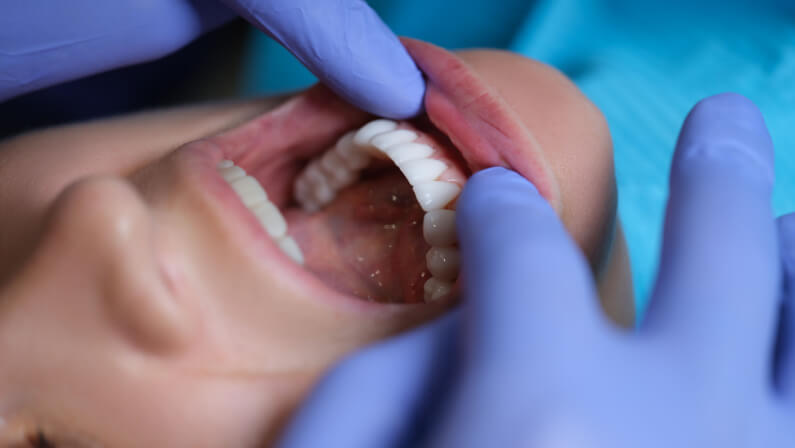In the world of cosmetic dentistry, veneers have become an increasingly popular solution for those seeking a brighter, more uniform smile.
Two of the most common types are composite and porcelain, each with unique advantages and drawbacks.
This blog post will explore the differences between composite veneers vs porcelain veneers, delving into their respective procedures, durability, aesthetics, and cost.
What are Veneers?
Veneers are thin, custom-made shells designed to cover the front surface of teeth, improving their appearance and providing a more aesthetically pleasing smile. They are typically made from either composite resin or porcelain materials, each offering distinct advantages.
Veneers can address a variety of dental imperfections, such as discoloration, chipping, misalignment, or gaps between teeth. They have become popular in cosmetic dentistry due to their ability to significantly enhance one’s smile with minimal tooth reduction.

How Do Veneers Work?
Veneers work by bonding to the front surface of the teeth, effectively concealing any imperfections and creating a more uniform, attractive appearance.
The process begins with an initial consultation, during which your dentist will assess your teeth and determine if veneers are a suitable option for you.
Once you and your dentist have agreed on the type of veneer material, the next step involves preparing your teeth for the veneers. This may involve removing a small amount of enamel from the tooth surface to create room for the veneer.
After tooth preparation, your dentist will take an impression of your teeth, which will be used to create the custom veneers.
When the veneers are ready, your healthcare provider will clean and etch the surface of your teeth to ensure strong bonding. The veneers are then carefully placed and bonded to your teeth using a special adhesive.
Finally, your dentist will make any necessary adjustments to ensure the veneers fit comfortably and look natural.
Types of Veneers
When it comes to improving your smile with veneers, there are two primary types to choose from: composite veneers and porcelain veneers. Both options have their unique benefits and drawbacks.
Composite Veneers
Composite veneers are made from a tooth-colored resin material, which is applied directly to the tooth surface and sculpted by the dentist to achieve the desired shape and appearance. Some benefits of composite veneers include the following:
- Less expensive than porcelain veneers
- Can be completed in a single dental clinic visit
- Minimal tooth reduction is required
- Can be easily repaired if damaged
However, there are some drawbacks to composite veneers as well:
- Less durable and more prone to staining compared to porcelain veneers
- May require more frequent maintenance and replacement
- May not look as natural or translucent as porcelain veneers
Porcelain Veneers
Porcelain veneers are thin shells made from high-quality ceramic material, custom-crafted in a dental laboratory to fit your teeth precisely. Porcelain veneers have several advantages over composite veneers:
- Highly durable and resistant to staining
- Provide a more natural and translucent appearance
- Longer-lasting, with a lifespan of up to 10-15 years or more with proper care
However, porcelain veneers also have some disadvantages:
- More expensive than composite veneers
- Require at least two dental visits for the procedure
- Tooth reduction is typically more extensive compared to composite veneers
- Can be challenging to repair if damaged
Which is Better: Porcelain Veneers vs. Composite Veneers?
Determining whether porcelain or composite veneers depends on several factors, including your specific dental needs, aesthetic goals, and budget.
Porcelain veneers are often considered the superior option in terms of aesthetics and durability. They provide a more natural, translucent appearance and are highly resistant to staining.
Additionally, they tend to last longer than composite veneers, with a lifespan of up to 10-15 years or more, with proper care.
On the other hand, composite veneers are a more affordable option and can be completed in a single dental visit. They require minimal tooth reduction and can be easily repaired if damaged.
However, they are less durable and more prone to staining compared to porcelain veneers and may require more frequent maintenance and replacement.

How To Decide Which Type Of Veneer Is Right For You
When deciding which type of veneer is right for you, consider the following factors:
- Aesthetic goals: If you are eyeing the most natural and lifelike appearance, porcelain veneers may be the better choice due to their translucency and ability to mimic the features of natural teeth.
- Budget: Composite veneers are generally less expensive than porcelain veneers, making them a more budget-friendly option. However, remember that they may require more frequent maintenance and replacement, which could affect the long-term cost.
- Time commitment: Composite veneers can be completed in a single dental visit, whereas porcelain veneers require at least two visits. If time is a significant concern, composite veneers may be the more convenient choice.
- Tooth structure preservation: Composite veneers typically require less tooth reduction compared to porcelain veneers, which may be a vital consideration if you prefer a more conservative approach to cosmetic dentistry.
- Durability and maintenance: Porcelain veneers are more durable and stain-resistant than composite veneers, making them a better choice if you are searching for a long-lasting solution with minimal maintenance.
The decision between porcelain and composite veneers should be made in consultation with your trusted dentist, who can assess your specific needs and preferences to help you pick the right option for your unique situation.
How Much Do Porcelain Veneers Cost?
The cost of porcelain veneers can vary significantly depending on considerations such as the location of the dental practice, the expertise of the dentist, the complexity of the case, and the total number of veneers required.
On average, porcelain veneers can range from $800 to $2,500 per tooth. It’s important to note that dental insurance typically does not cover the cost of porcelain veneers, as they are considered a cosmetic procedure.
How Much Do Composite Veneers Cost?
Composite veneers are generally more affordable than porcelain veneers. The cost of composite veneers can range from $250 to $1,500 per tooth, depending on the same factors mentioned above. Like porcelain veneers, composite veneers are also considered a cosmetic procedure and are usually not covered by dental insurance.
Who Is Eligible for Dental Veneers?
Dental veneers may be an appropriate solution for individuals who want to address various cosmetic dental concerns, such as discolored, chipped, misaligned, or unevenly spaced teeth.
However, not everyone is a suitable candidate for dental veneers. Factors that can affect your eligibility for dental veneers include:
- Oral health: Good oral health is essential for dental veneer candidates. Oral issues like gum disease, tooth decay, or an active infection should be addressed before considering veneers.
- Tooth structure: Sufficient tooth enamel is necessary for veneers to bond effectively. If your teeth have experienced significant enamel loss or are severely damaged, veneers may not be the best option.
- Bruxism: If you suffer from bruxism, also known as teeth grinding or clenching), veneers may not be suitable, as the pressure can cause damage or breakage. In such cases, your dentist may recommend treating the bruxism before considering veneers.
- Misaligned bite: Severe bite issues may need to be corrected with orthodontic treatment before veneers can be considered.
To know if you are eligible for dental veneers, consult with your dentist, who can assess your oral health and specific needs to help you make an informed decision.

How to Take Care of Your Veneers
Taking proper care of your dental veneers is essential to maintain their appearance and longevity. Here are several pointers to help you maintain your veneers:
- Practice good oral hygiene: Brush your teeth twice daily using a soft-bristled toothbrush and fluoride toothpaste. Floss daily to remove plaque and food debris from between your teeth and along the gumline.
- Avoid staining foods and beverages: Limit your consumption of staining foods and drinks such as coffee, tea, red wine, and dark-colored berries. Rinse your mouth with water after consuming these items to minimize staining.
- Avoid biting hard objects: Refrain from using your teeth to bite or chew on hard objects, such as ice, pens, or fingernails, as this can damage your veneers.
- Wear a mouthguard: If you have a condition of teeth grinding or participate in contact sports, wear a custom-fitted mouthguard to protect your veneers from damage.
- Schedule regular dental checkups: Visit your dentist regularly for professional cleanings and checkups to ensure your veneers remain in good condition.
Dentist Recommendations
Dr. Saif Shere, a renowned cosmetic and celebrity dentist, highly recommends porcelain veneers as an ideal solution for individuals looking to enhance their smile and boost their confidence.
Porcelain veneers offer a natural, long-lasting, and stain-resistant option that can address a wide range of cosmetic dental concerns, including discolored, chipped, or misaligned teeth.
Dr. Shere’s expertise and attention to detail ensure that each patient gets the highest quality care and results that exceed their expectations.
By choosing Dr. Saif Shere’s Brownstone Dental for your porcelain veneer treatment, you can trust that you are in the hands of an experienced professional who is dedicated to helping you achieve a beautiful, confident smile.
Don’t wait any longer to transform your smile and boost your self-esteem. Schedule a consultation with Dr. Saif Shere today to discuss your options and discover how porcelain veneers can enhance your appearance and improve your overall quality of life.